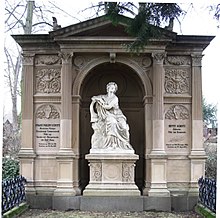Franz Schott
Franz Philipp Schott (born July 30, 1811 in Mainz , † May 8, 1874 in Milan ) was a German music publisher.
Entrepreneur
From 1855 Schott was the sole owner of the music publisher B. Schott's Söhne , which has existed as Schott Music up to our time. He succeeded in firmly establishing the cooperation with Richard Wagner and thereby setting a milestone in the company's history.
The entrepreneur is one of the great Mainz patrons of the 19th century. Among other things, he donated a significant share for the construction of the Schiller monument, which was inaugurated by Karl Schmitz on the renamed Schillerplatz . Together with his wife Betty, née von Braunrasch, he set up a foundation for the establishment and maintenance of a permanent orchestra in Mainz. The Schottenhof in today's Gaustraße also belonged to the foundation .
In his villa in Laubenheim he received many important musicians of his time. He was a member of the Mainz Masonic lodge “The Friends of Unity”.
Cooperation with Richard Wagner
Richard Wagner made his first contacts with Schott in connection with the sale of the publishing rights for his opera cycle Der Ring des Nibelungen in 1859. A close cooperation and finally a friendly relationship began with the "genesis" of Wagner's opera " Die Meistersinger von Nürnberg ". In financial need, Wagner offered the Mainz publisher in 1861 to compose and compose a new “cheerful work” exclusively for Schott (for an advance fee). Schott agreed, whereupon Wagner immediately began to work and a little later moved to Wiesbaden-Biebrich - in eye contact with Mainz - in order to complete his work. However, Wagner could not keep his promise, whereupon a "legendary exchange of letters" took place.
Wagner wrote to Schott in October 1862:
- If the “Mastersingers” have been delayed, I am now arranging my entire life to make up for what I missed. When you come back, you should also hear from the "Mastersingers" and hopefully soon realize what it is all about. Only now: quick help! Otherwise I'll go into the water!
Schott's answer:
- I have to pass over the reported effusion of one of your sleepless nights with silence, because although I know how to behave towards artists, I do not want to tell you what I ask of an artist. I cannot provide you with the larger amount requested. In general, a music publisher cannot deny your needs; this can only be done by an enormously wealthy banker or a prince who has millions at his disposal. If this is not found, one would have to appeal to the German people.
As is well known, Wagner found the "Prince" in King Ludwig II of Bavaria a few years later . Schott later supported the first Bayreuth Festival and paid Wagner the highest fee from a music publisher to date of 100,000 Reichsmarks for his last work Parsifal .
Richard Wagner's letters to Franz Schott are among the outstanding treasures of the Mainz City Library .
mayor
Between January 1865 and January 1871, Franz Schott held the office of Mayor of Mainz . The term of office was relatively short, but due to the German Wars of Unification , the Prussian-Austrian War (1866) and the Franco-Prussian War of 1870/71, it was restless and sorrowful. On July 20, 1866, the state of siege was imposed on the fortress and town. In order to avoid conflicts in the garrison, the bulk of the Prussian and Austrian soldiers left the fortress. During the transition period, Bavarian troops and the governor were housed in the fortress. After the preliminary peace in Nikolsburg and finally the peace treaty of Prague , the Austrians finally left the Mainz fortress in 1866 and from then on the Prussian military determined the fate of the Mainz fortress . Franz Schott participated in various submissions to the Prussian fortress authorities in order to be able to expand the city of Mainz, which was constricted by the fortress belt. ( see article: Mainz-Neustadt ). The friction, which lasted for many years due to the garrison operations and the many "foreign" soldiers, especially the Prussian soldiers, could be reduced to a tolerable level through his mediation efforts. He maintained a good relationship with the governor of the fortress , Prince Holstein , who became an honorary citizen of the city of Mainz from 1871 .
One of the highlights of his tenure was in the initial phase of the Franco-Prussian War, when Mainz was the headquarters for five days and King Wilhelm I and Bismarck (in the house of Kupferberg ) stayed in Mainz. The founding of a “Women's Association of the Red Cross” by Grand Duchess Alice of Hesse and by the Rhine and the Red Cross in Mainz formed the nucleus for the “Medical Aid Associations” at the main dressing center in Mainz during the first days of the war.
When Kommerzienrat Franz Schott died in Milan on May 8, 1874 at the age of 63, the music publishing company passed to the Strecker family. His grave is in the main cemetery in Mainz .
The (short) Schottstraße at Mainz main station is named after him.
literature
- Marion Brück: Schott, Franz Philipp. In: New German Biography (NDB). Volume 23, Duncker & Humblot, Berlin 2007, ISBN 978-3-428-11204-3 , p. 487 ( digitized version ).
Individual evidence
- ↑ History of the DRK-Mainz ( page no longer available , search in web archives ) Info: The link was automatically marked as defective. Please check the link according to the instructions and then remove this notice.
| personal data | |
|---|---|
| SURNAME | Schott, Franz |
| ALTERNATIVE NAMES | Schott, Franz Philipp (full name) |
| BRIEF DESCRIPTION | German music publisher and Mayor of Mainz |
| DATE OF BIRTH | July 30, 1811 |
| PLACE OF BIRTH | Mainz |
| DATE OF DEATH | May 8, 1874 |
| Place of death | Milan |



